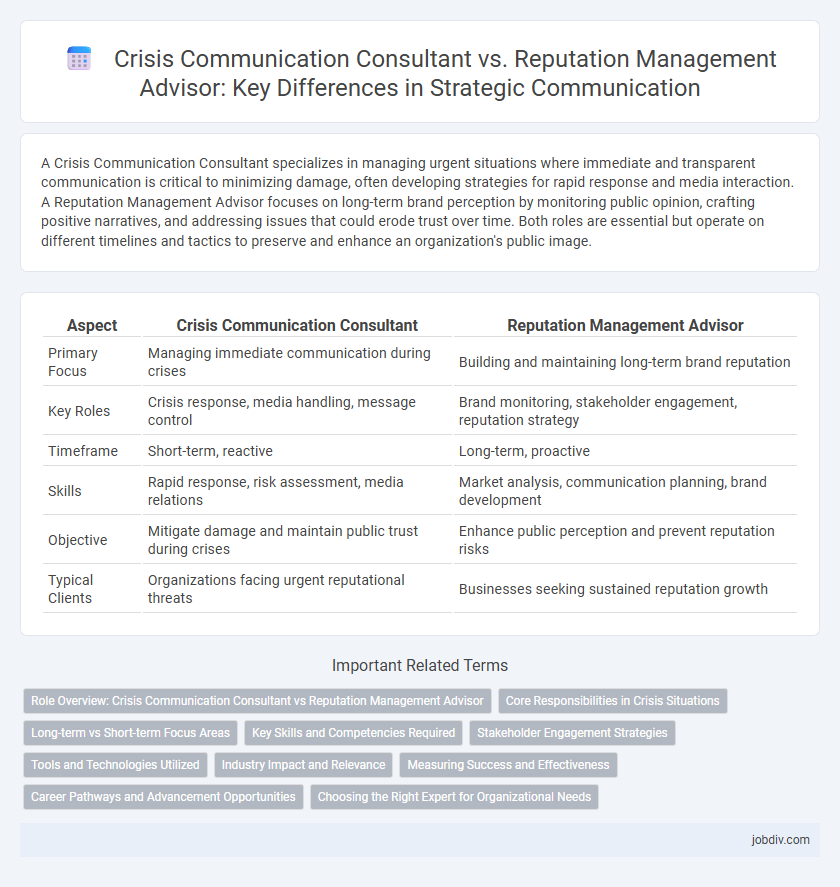A Crisis Communication Consultant specializes in managing urgent situations where immediate and transparent communication is critical to minimizing damage, often developing strategies for rapid response and media interaction. A Reputation Management Advisor focuses on long-term brand perception by monitoring public opinion, crafting positive narratives, and addressing issues that could erode trust over time. Both roles are essential but operate on different timelines and tactics to preserve and enhance an organization's public image.
Table of Comparison
| Aspect | Crisis Communication Consultant | Reputation Management Advisor |
|---|---|---|
| Primary Focus | Managing immediate communication during crises | Building and maintaining long-term brand reputation |
| Key Roles | Crisis response, media handling, message control | Brand monitoring, stakeholder engagement, reputation strategy |
| Timeframe | Short-term, reactive | Long-term, proactive |
| Skills | Rapid response, risk assessment, media relations | Market analysis, communication planning, brand development |
| Objective | Mitigate damage and maintain public trust during crises | Enhance public perception and prevent reputation risks |
| Typical Clients | Organizations facing urgent reputational threats | Businesses seeking sustained reputation growth |
Role Overview: Crisis Communication Consultant vs Reputation Management Advisor
A Crisis Communication Consultant specializes in managing urgent communication strategies during emergencies to protect an organization's immediate stability and public safety. In contrast, a Reputation Management Advisor focuses on long-term brand perception, leveraging strategic messaging to build and maintain positive stakeholder trust over time. Both roles require expertise in media relations and strategic communication but differ in their emphasis on short-term crisis mitigation versus sustained reputation enhancement.
Core Responsibilities in Crisis Situations
A Crisis Communication Consultant specializes in crafting strategic messages to manage and mitigate the impact of unexpected events, focusing on real-time response and media relations to protect organizational stability. A Reputation Management Advisor centers on long-term brand perception, deploying tactics to restore trust and improve public opinion after a crisis. Both roles prioritize transparent communication and stakeholder engagement but differ in immediacy and scope of intervention during crisis situations.
Long-term vs Short-term Focus Areas
A Crisis Communication Consultant specializes in managing immediate responses to urgent situations, mitigating damage through rapid messaging and media engagement to protect a brand's short-term image. A Reputation Management Advisor focuses on long-term strategies that build and maintain a positive public perception, emphasizing consistent communication, brand values, and stakeholder trust over time. Both roles are essential, with crisis consultants addressing urgent risks and reputation advisors cultivating lasting credibility and goodwill.
Key Skills and Competencies Required
A Crisis Communication Consultant specializes in rapid response, message control, and media relations to manage unfolding emergencies, requiring skills in strategic thinking, stress management, and clear, concise communication. A Reputation Management Advisor focuses on long-term brand perception, leveraging skills in stakeholder engagement, digital monitoring, and narrative development to shape public opinion and restore trust. Both roles demand strong interpersonal abilities, adaptability, and expertise in risk assessment but differ in their approach to timing and scope of communication strategies.
Stakeholder Engagement Strategies
A Crisis Communication Consultant specializes in rapid-response strategies to manage urgent issues, prioritizing transparent and timely communication to maintain stakeholder trust during high-pressure events. Reputation Management Advisors focus on long-term perception, employing strategic narrative development and consistent stakeholder engagement to rebuild and enhance brand image over time. Effective stakeholder engagement strategies differ as crisis consultants emphasize immediate, clear messaging, while reputation advisors invest in sustained relationship-building and reputation resilience.
Tools and Technologies Utilized
Crisis Communication Consultants leverage real-time monitoring platforms, media tracking software, and social listening tools to swiftly identify and address emerging threats. Reputation Management Advisors utilize comprehensive analysis tools like sentiment analysis, SEO monitoring, and brand health dashboards to maintain and improve public perception over time. Both roles incorporate AI-driven analytics and digital communication channels to optimize messaging and stakeholder engagement.
Industry Impact and Relevance
Crisis communication consultants specialize in managing immediate threats to a brand's image during high-pressure situations, leveraging real-time media monitoring and stakeholder engagement to minimize damage. Reputation management advisors focus on long-term brand perception, employing strategic content creation, social proof amplification, and online review management to build and sustain trust. Both roles are critical across industries with high public exposure, such as finance, healthcare, and technology, where rapid response and credible reputation are vital to business continuity and growth.
Measuring Success and Effectiveness
Crisis Communication Consultants measure success through real-time media monitoring, stakeholder sentiment analysis, and resolution speed during high-pressure situations. Reputation Management Advisors evaluate effectiveness by tracking long-term brand perception metrics, social media engagement, and customer loyalty over time. Both roles utilize tailored KPIs to align communication strategies with organizational goals and ensure measurable impact.
Career Pathways and Advancement Opportunities
A Crisis Communication Consultant specializes in managing real-time communication strategies during high-pressure situations, often requiring expertise in media relations, risk assessment, and rapid response tactics, leading to roles such as Chief Communication Officer or Director of Crisis Management. In contrast, a Reputation Management Advisor focuses on long-term brand image building through digital reputation monitoring, stakeholder engagement, and strategic messaging, paving the way toward senior roles like Brand Strategist or Corporate Communications Vice President. Both career pathways offer advancement through developing specialized skills and expanding networks within corporate, public sector, or agency environments, with opportunities to influence organizational resilience and public trust.
Choosing the Right Expert for Organizational Needs
Selecting between a Crisis Communication Consultant and a Reputation Management Advisor hinges on the organization's immediate priorities and long-term goals. Crisis Communication Consultants specialize in real-time response strategies to mitigate damage during unexpected events, while Reputation Management Advisors focus on building and maintaining a positive public image over time. Understanding the specific risks and communication challenges faced by the organization ensures collaboration with the expert who best aligns with its strategic objectives.
Crisis Communication Consultant vs Reputation Management Advisor Infographic

 jobdiv.com
jobdiv.com